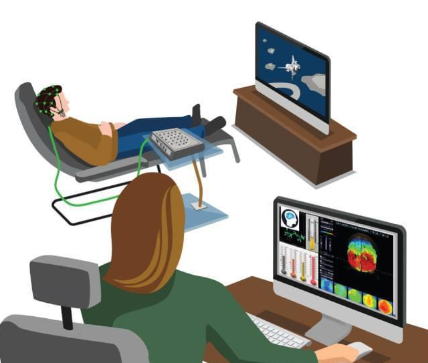Neurofeedback
Training For Your Brain
It all starts with understanding your brainwaves.
What are brainwaves?
We all have them all over our brain. They all have different functions and help with different things.
The brain is an electrochemical organ, meaning that if you hooked up enough wires to your scalp, you might be able to power a light bulb. This electrical communication happens through neurons, which are specialized brain cells that are responsible for transmitting information through the body in both chemical and electrical forms. And the electrical activity from these neurons communicating is measured in the form of brainwaves.
When we have too much or too little of any of these brainwaves, it can lead to issues. For example, too much alpha or theta in the frontal lobes can cause ADHD symptoms or it can cause issues with depression and motivation (to name a few).
Too much hibeta can lead to feelings of anxiety, stress, overwhelm, panic, sleep problems, etc.
In neurofeedback, we are training the brainwaves to be in the frequencies that are healthier. As neurofeedback practitioners, we have an understanding of what feels good and helps the brain.
When we have an understanding of your symptoms and we look in the brain (sometimes with EEGs or QEEGs) we can determine the problem areas and train up or down the frequencies that need it.
The how. We paste electrodes to your head (they are non-invasive, do not hurt, and nothing is going into your brain) they simply help us see what the brainwaves are doing.
Once the leads are pasted on, we set a protocol for your brain to receive positive feedback whenever it is in the frequency that can positively shift your brainwaves. This is done by using beeps or tones (auditory feedback) and, while watching a show, the screen will get lighter and darker (the visual feedback). Whenever the brain hears the beeps and the show gets lighter, the brain is learning the healthier frequency patterns to replicate for the client to benefit from.
Essentially, we are using operant conditioning to train the brain. We are training the brain to create new frequencies and pathways by positively rewarding it.
This is not something that you consciously do, the brain will do the work. Neurofeedback is not a one stop shop. It does take time. However, you can even feel benefits after one session, but in order to create healthier longlasting patterns, the brain needs training and it can take 20, 40, and sometimes 60 sessions to do so.
When I work with someone, we usually start out doing twice a week sessions and as time goes on, or as the schedule allows, go down to once per week.
Most clients will see a benefit within 5-10 sessions. The rest of the sessions are to make the positive effects long lasting.
I am trained as a neurofeedback practitioner and studied with a mentor for five years before venturing out on my own. Neurofeedback is an art, and I feel I can intuitively tell with practice and loads of training what sites and protocols will help my clients.
The picture below depicts an example of a session. You will be sitting in a comfortable chair watching a show or playing a game, and the neurofeedback practitioner is sitting in front a computer monitoring your brainwave activity. The protocol is set up for the beeps to go off when the brain is in the right frequencies.
For a deeper understanding of brainwaves and neurofeedback:
Brainwave Overview
Delta Less Than 4 Hz: Your deep, dreamless sleep
Theta 4-8 Hz: Deep relaxation, visual imagery, meditation
Alpha 8-12 Hz: Relaxed, lucid, calm
SMR (low beta) 12-15 Hz: Calm, extremely aware, alert
Beta 13-30 Hz: Awake, alert, consciousness
Gamma 30 Hz +: Heightened perception
Who Can This Help?
People who experience any of the following:
Anxiety
Sleep issues
Headaches
Low motivation
ADHD
Emotion regulation issues
Depression
PTSD





